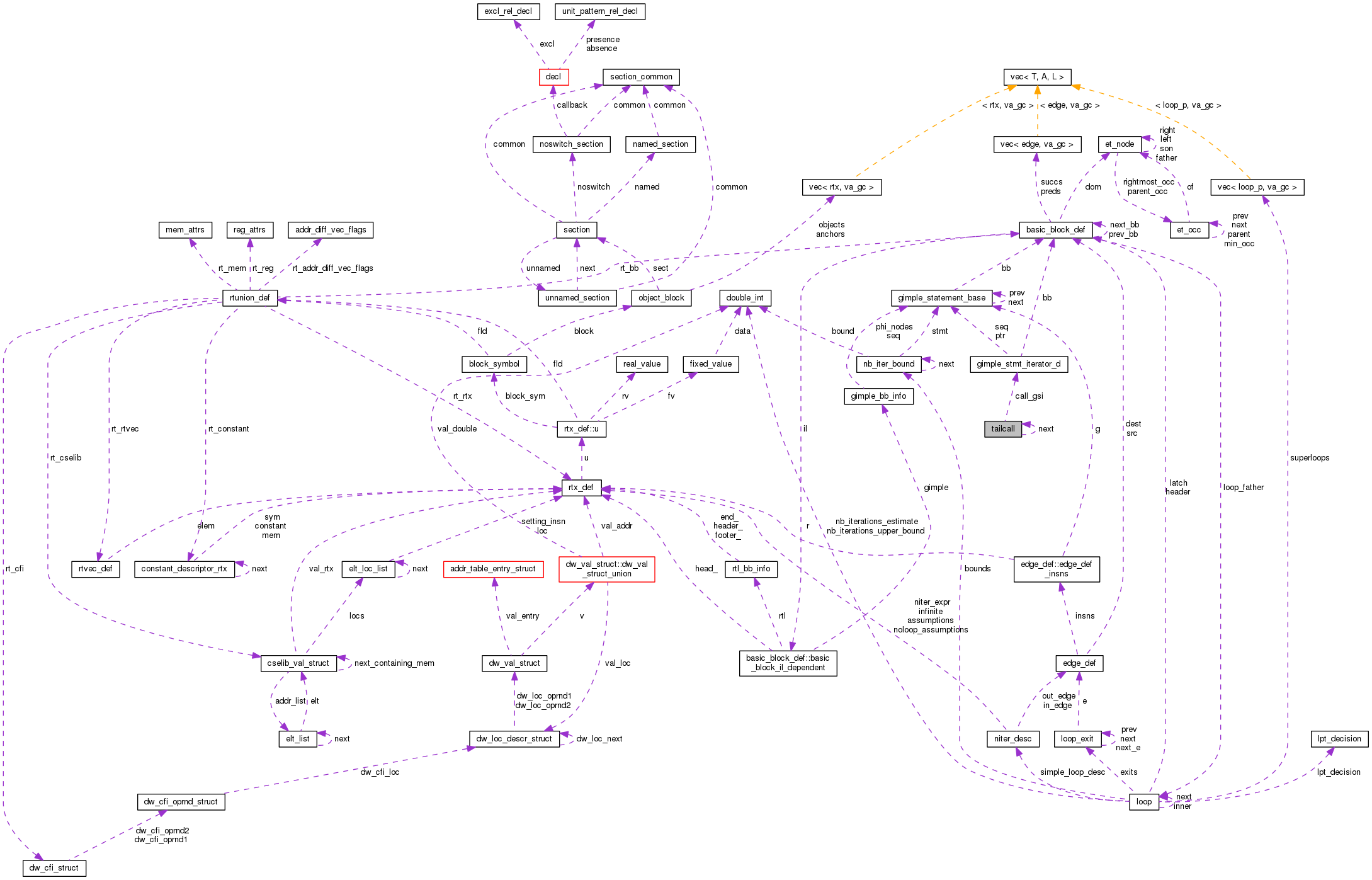
Data Fields | |
| gimple_stmt_iterator | call_gsi |
| bool | tail_recursion |
| tree | mult |
| tree | add |
| struct tailcall * | next |
Detailed Description
Tail call optimization on trees. Copyright (C) 2003-2013 Free Software Foundation, Inc.
This file is part of GCC.
GCC is free software; you can redistribute it and/or modify it under the terms of the GNU General Public License as published by the Free Software Foundation; either version 3, or (at your option) any later version.
GCC is distributed in the hope that it will be useful, but WITHOUT ANY WARRANTY; without even the implied warranty of MERCHANTABILITY or FITNESS FOR A PARTICULAR PURPOSE. See the GNU General Public License for more details.
You should have received a copy of the GNU General Public License along with GCC; see the file COPYING3. If not see http://www.gnu.org/licenses/. The file implements the tail recursion elimination. It is also used to analyze the tail calls in general, passing the results to the rtl level where they are used for sibcall optimization.
In addition to the standard tail recursion elimination, we handle the most trivial cases of making the call tail recursive by creating accumulators. For example the following function
int sum (int n) { if (n > 0) return n + sum (n - 1); else return 0; }
is transformed into
int sum (int n) { int acc = 0;
while (n > 0) acc += n–;
return acc; }
To do this, we maintain two accumulators (a_acc and m_acc) that indicate when we reach the return x statement, we should return a_acc + x * m_acc instead. They are initially initialized to 0 and 1, respectively, so the semantics of the function is obviously preserved. If we are guaranteed that the value of the accumulator never change, we omit the accumulator.
There are three cases how the function may exit. The first one is handled in adjust_return_value, the other two in adjust_accumulator_values (the second case is actually a special case of the third one and we present it separately just for clarity):
1) Just return x, where x is not in any of the remaining special shapes. We rewrite this to a gimple equivalent of return m_acc * x + a_acc.
2) return f (...), where f is the current function, is rewritten in a classical tail-recursion elimination way, into assignment of arguments and jump to the start of the function. Values of the accumulators are unchanged.
3) return a + m * f(...), where a and m do not depend on call to f. To preserve the semantics described before we want this to be rewritten in such a way that we finally return
a_acc + (a + m * f(...)) * m_acc = (a_acc + a * m_acc) + (m * m_acc) * f(...).
I.e. we increase a_acc by a * m_acc, multiply m_acc by m and eliminate the tail call to f. Special cases when the value is just added or just multiplied are obtained by setting a = 0 or m = 1.
TODO – it is possible to do similar tricks for other operations. A structure that describes the tailcall.
Field Documentation
| tree tailcall::add |
| gimple_stmt_iterator tailcall::call_gsi |
The iterator pointing to the call statement.
| tree tailcall::mult |
The return value of the caller is mult * f + add, where f is the return value of the call.
| struct tailcall* tailcall::next |
Next tailcall in the chain.
| bool tailcall::tail_recursion |
True if it is a call to the current function.
The documentation for this struct was generated from the following file:
